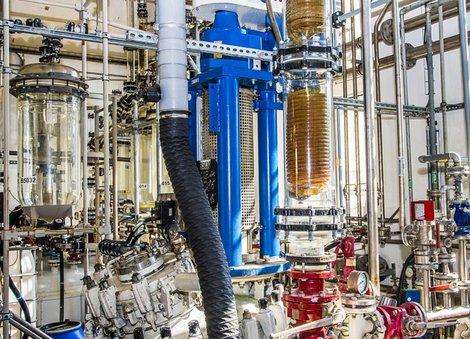Where Complex Molecules are Designed

ORGANICA Feinchemie GmbH Wolfen develops multi-step synthesis methods commissioned by customers to produce materials with sophisticated organic structures.
ORGANICA enters uncharted territory with each and every new order. It specializes in custom synthesis, developing both manufacturing processes and products tailored to customer requirements. At the same time, it handles substances classified as hazardous and supplies annual volumes of between 50 kilograms and 50 tonnes per product. This combination of factors has cornered the firm a niche market with burgeoning demand.
Tradition makes its own mark
The business of synthesis has a long-standing heritage at ORGANICA’s location. Bitterfeld-Wolfen Chemical Park in Central Germany has been home to reactors, distillation facilities, drying chambers and centrifuges (and their earlier counterparts) for 125 years – an appealing tradition that is drawing more and more relocations to the park. ORGANICA’s Managing Director Dr. Jörg Blumhoff believes this legacy, plus the open-mindedness toward and affinity for chemistry among the park’s inhabitants, is one of its advantages. Others include being in the vicinity of many other chemicals and fine chemicals businesses as well as good road and rail access provided by the excellent infrastructure. And with universities and universities of applied sciences close by in Halle, Leipzig, Berlin and Jena, there is a ready local supply of qualified chemists. “Going forward, I’d like to do more in terms of supporting chemistry students. I can imagine us providing bachelor’s and master’s projects soon,” says Blumhoff, who envisages this as a new field of activity.
ORGANICA Feinchemie GmbH Wolfen was established 25 years ago, but the production facility is older, dating back to the intermediates business of Filmfabrik Wolfen. To some extent this legacy has also shaped the production operations at the site today, and explains not only the way in which the company has made its own mark, but also its expertise in dealing with hazardous reactions – involving high pressure for example – and using safety-critical materials such as carbon disulfide. “Not everyone knows how to work with sodium azide and nitration either,” says Blumhoff. ORGANICA’s 99 employees are well versed in this work. Many of them are trained and developed in-house.
Flexible structures, flexible volumes
ORGANICA produces sophisticated organic structures in multi-step processes – many of them exclusively made to order – for over 200 customers in 35 countries. Blumhoff speaks very highly of the skills and efficiency of the two chemists and four lab technicians in the in-house Research and Development department who develop a large number of projects in parallel. “We always work very closely with our customers,” he stresses. The homepage of ORGANICA’s website is further testament to the firm’s respect for customers: the MD himself is the contact for inquiries.
As diverse as the mix of companies at the chemical park is, this medium-sized business, like many others, has cornered a niche based on its own versatility, and one that is attracting more and more orders. Blumhoff believes the firm’s flexible structure and production volumes are critical success factors along with its highly qualified and adaptable employees – even in Production where a great deal of the work is manual. Blumhoff says it’s hard graft; he has the greatest respect for the chemical workers. “We have multi-purpose facilities so that we can manufacture a really diverse range of products,” he explains. “So automation isn’t really worthwhile but we’re in an ideal position to respond to customer requirements.” And since everyone involved with each project learns something new, ORGANICA rarely declines a request. What’s more, everyone is on good terms thanks to the specific nature of neighboring companies. Since each business has its own specialties, they compare notes in nationwide networks like CASID e.V. (the association for Chemical Custom Synthesis in Germany) and 4chiral (specializing in chiral compounds).
ORGANICA sells 180 to 220 products a year, some off-the-shelf but primarily materials manufactured by custom synthesis. It serves customers in the imaging industry, pharmacy and traditional fine chemistry, but also cosmetics and electronics. “People come to us. Most of our customers hear of us by word-of-mouth but we also receive inquiries via our website,” explains Blumhoff. Most become long-term customers. Of course, ORGANICA also exhibits at trade fairs. “2019 was our best year to date – we made sales of €18.3 million, including €1.3 million from new products,” says Blumhoff. He has no plans to relocate. His strategy is to increase the existing location’s added-value.
The Bitterfeld-Wolfen Chemical Park is one of Saxony-Anhalt’s Centers of Excellence, where knowledge, research and trade cross-fertilize each other. By focusing on their core competence, the centers are conquering the global market with new ideas and products and, like ORGANICA, meeting specific needs by leveraging specific strengths. Suppliers and service providers are in the immediate vicinity, at short distances that make communication easier. And communication, emphasizes Blumhoff, is a critical success factor – internally, with customers, and with partners.
Author: Renate Wähnelt/IMG Saxony-Anhalt
HERE the chemistry is right.

Traditionally, Saxony-Anhalt offers the complete value chain from basic chemicals to the processing industry. In the fields of polymer synthesis, agrochemicals as well as fine and specialty chemicals, the state has developed into a leading competence center. A distinctive raw materials network, supported by the state's 5 chemical parks, creates profitable synergy opportunities.
